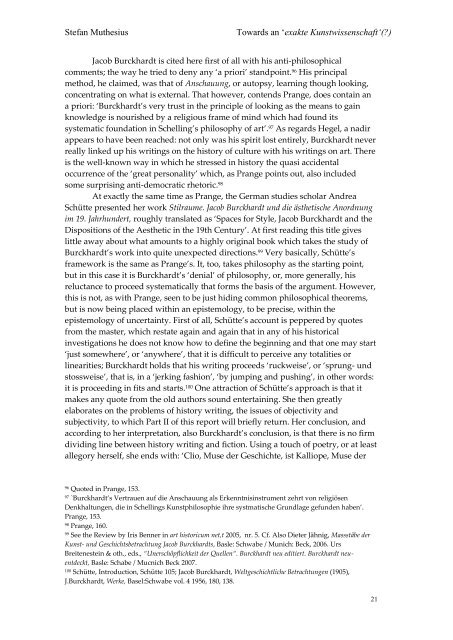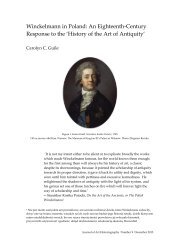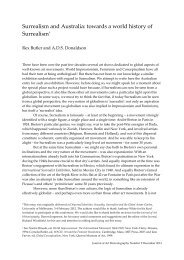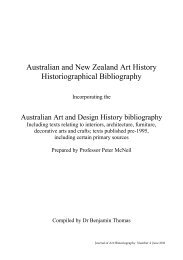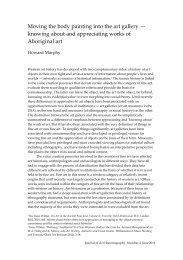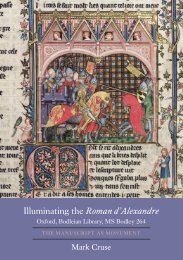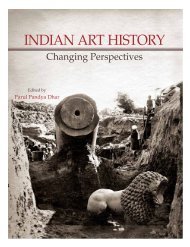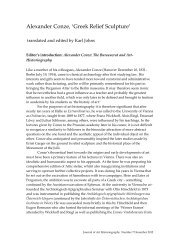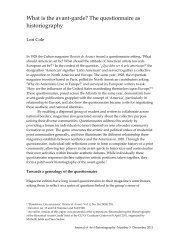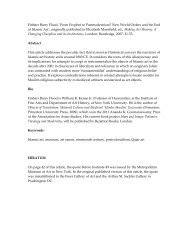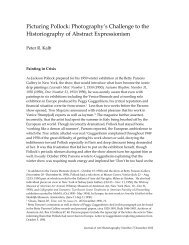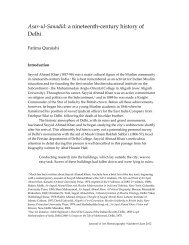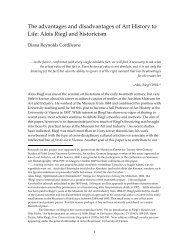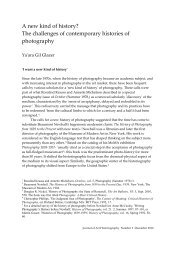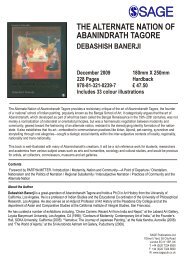9/SM1 - Journal of Art Historiography
9/SM1 - Journal of Art Historiography
9/SM1 - Journal of Art Historiography
Create successful ePaper yourself
Turn your PDF publications into a flip-book with our unique Google optimized e-Paper software.
Stefan Muthesius<br />
Towards an ‘exakte Kunstwissenschaft‘(?)<br />
Jacob Burckhardt is cited here first <strong>of</strong> all with his anti-philosophical<br />
comments; the way he tried to deny any ‘a priori’ standpoint. 96 His principal<br />
method, he claimed, was that <strong>of</strong> Anschauung, or autopsy, learning though looking,<br />
concentrating on what is external. That however, contends Prange, does contain an<br />
a priori: ‘Burckhardt’s very trust in the principle <strong>of</strong> looking as the means to gain<br />
knowledge is nourished by a religious frame <strong>of</strong> mind which had found its<br />
systematic foundation in Schelling’s philosophy <strong>of</strong> art’. 97 As regards Hegel, a nadir<br />
appears to have been reached: not only was his spirit lost entirely, Burckhardt never<br />
really linked up his writings on the history <strong>of</strong> culture with his writings on art. There<br />
is the well-known way in which he stressed in history the quasi accidental<br />
occurrence <strong>of</strong> the ‘great personality’ which, as Prange points out, also included<br />
some surprising anti-democratic rhetoric. 98<br />
At exactly the same time as Prange, the German studies scholar Andrea<br />
Schütte presented her work Stilraume. Jacob Burckhardt und die ästhetische Anordnung<br />
im 19. Jahrhundert, roughly translated as ‘Spaces for Style, Jacob Burckhardt and the<br />
Dispositions <strong>of</strong> the Aesthetic in the 19th Century’. At first reading this title gives<br />
little away about what amounts to a highly original book which takes the study <strong>of</strong><br />
Burckhardt’s work into quite unexpected directions. 99 Very basically, Schütte’s<br />
framework is the same as Prange’s. It, too, takes philosophy as the starting point,<br />
but in this case it is Burckhardt’s ‘denial’ <strong>of</strong> philosophy, or, more generally, his<br />
reluctance to proceed systematically that forms the basis <strong>of</strong> the argument. However,<br />
this is not, as with Prange, seen to be just hiding common philosophical theorems,<br />
but is now being placed within an epistemology, to be precise, within the<br />
epistemology <strong>of</strong> uncertainty. First <strong>of</strong> all, Schütte’s account is peppered by quotes<br />
from the master, which restate again and again that in any <strong>of</strong> his historical<br />
investigations he does not know how to define the beginning and that one may start<br />
‘just somewhere’, or ‘anywhere’, that it is difficult to perceive any totalities or<br />
linearities; Burckhardt holds that his writing proceeds ‘ruckweise’, or ‘sprung- und<br />
stossweise’, that is, in a ‘jerking fashion’, ‘by jumping and pushing’, in other words:<br />
it is proceeding in fits and starts. 100 One attraction <strong>of</strong> Schütte’s approach is that it<br />
makes any quote from the old authors sound entertaining. She then greatly<br />
elaborates on the problems <strong>of</strong> history writing, the issues <strong>of</strong> objectivity and<br />
subjectivity, to which Part II <strong>of</strong> this report will briefly return. Her conclusion, and<br />
according to her interpretation, also Burckhardt’s conclusion, is that there is no firm<br />
dividing line between history writing and fiction. Using a touch <strong>of</strong> poetry, or at least<br />
allegory herself, she ends with: ‘Clio, Muse der Geschichte, ist Kalliope, Muse der<br />
96<br />
Quoted in Prange, 153.<br />
97<br />
`Burckhardt’s Vertrauen auf die Anschauung als Erkenntnisinstrument zehrt von religiösen<br />
Denkhaltungen, die in Schellings Kunstphilosophie ihre systmatische Grundlage gefunden haben’.<br />
Prange, 153.<br />
98<br />
Prange, 160.<br />
99<br />
See the Review by Iris Benner in art historicum net,t 2005, nr. 5. Cf. Also Dieter Jähnig, Massstäbe der<br />
Kunst- und Geschichtsbetrachtung Jacob Burckhardts, Basle: Schwabe / Munich: Beck, 2006. Urs<br />
Breitenestein & oth., eds., “Unerschôpflichkeit der Quellen“. Burckhardt neu editiert. Burckhardt neuentdeckt,<br />
Basle: Schabe / Mucnich Beck 2007.<br />
100<br />
Schütte, Introduction, Schütte 105; Jacob Burckhardt, Weltgeschichtliche Betrachtungen (1905),<br />
J.Burckhardt, Werke, Basel:Schwabe vol. 4 1956, 180, 138.<br />
21


